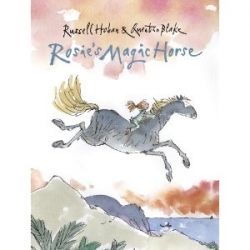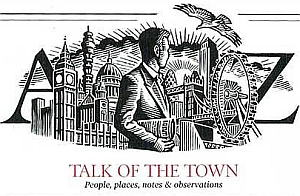from KLEINZEIT:
HOW-CAN-I-MAKE-WORDS-STAY-ON-THE-PAPER? said Kleinzeit very slowly, as if talking to a foreigner.
They'll stay if you don't put them there, said the yellow paper.
How do I do that?
You don't do it, it happens.
How does it happen?
You simply have to find what's there and let it be, said the yellow paper.
Find what's where? said Kleinzeit.
Here, said the yellow paper. Now.
from RIDDLEY WALKER:
She said, ‘Its some kynd of thing it aint us but yet its in us. Its looking out thru our eye hoals. May be you dont take no noatis of it only some times. Say you get woak up suddn in the middle of the nite. 1 minim youre a sleap and the nex youre on your feet with a spear in your han. Wel it wernt you put that spear in your han it wer that other thing whats looking out thru your eye hoals. It aint you nor it dont even know your name. Its in us lorn and loan and sheltering how it can.’
. . .
She larft then she said, ‘Riddley there aint nothing what aint a tel for you. The wind in the nite the dus on the road even the leases stoan you kick a long in front of you. Even the shadder of that leases stoan roaling on or stanning stil its all telling.’
from KLEINZEIT:
An appalling sunny afternoon sky. When Napoleon spoke of two o'clock courage he could only have meant two in the afternoon, thought Kleinzeit. Two in the morning's nothing compared to it.
. . .
Life is the original sickness of inanimate matter.
from PILGERMANN:
Life cannot tolerate itself, life wants to become death.
from THE LION OF BOAZ-JACHIN AND JACHIN-BOAZ:
Beyond the windows of the dining room the sea sparkled in the sunlight. Part of an island passed, a straggle of ruins, a broken citadel, the pillars of a temple, two figures on a hill. Gulls rose and fell on the air currents beside the ship. This, said the sea. Only this. What? thought Boaz-Jachin. Who? Who is looking out through the eyeholes in my face? No one, said the sea. Only this.
. . .
The petrol stations, owning the world, called to their brother monsters. Distant towers flashed lights. The petrol stations kept up their pretence, fuelled cars and lorries, maintained the fiction of roads for humans. Vast pipes slid effortlessly over miles of world. Huge valves regulated flow. Lights flashed at sea. Music played in aeroplanes. Never did the music name the pipes and petrol stations, the great steel stalking that laughed with striding legs. God is with us, said the valves and towers. With us, said the stones. Cars moved on roads.
. . .
It ceased to matter to him who was looking out through the eyeholes in his face and it ceased to matter who was looking in.
. . .
After all, when you come right down to it, how many people speak the same language even when they speak the same language?






 On 4 February 2012 the Slickman A4 Quotation Event celebrated
On 4 February 2012 the Slickman A4 Quotation Event celebrated 


 In 2005 the first international convention for Russell Hoban fans took place in London, and was marked by the publication of a fantastic 48-page booklet featuring exclusive contributions from innumerable fans and associates including novelist David Mitchell and actress Glenda Jackson. A wonderful memento of the event, it's also a beautiful collector's item and must-have for any Hoban fan. Although in limited supply, copies of the booklet are still available at £6.00 each plus p&p. Order direct from
In 2005 the first international convention for Russell Hoban fans took place in London, and was marked by the publication of a fantastic 48-page booklet featuring exclusive contributions from innumerable fans and associates including novelist David Mitchell and actress Glenda Jackson. A wonderful memento of the event, it's also a beautiful collector's item and must-have for any Hoban fan. Although in limited supply, copies of the booklet are still available at £6.00 each plus p&p. Order direct from  Russell Hoban turned 86 on 4 February 2011 and fans celebrated in traditional style by leaving quotes from his books in public places. Browse their quotes
Russell Hoban turned 86 on 4 February 2011 and fans celebrated in traditional style by leaving quotes from his books in public places. Browse their quotes  To celebrate 30 years in print of Russell Hoban's most famous novel
To celebrate 30 years in print of Russell Hoban's most famous novel 






No comments:
Post a Comment
Note: only a member of this blog may post a comment.